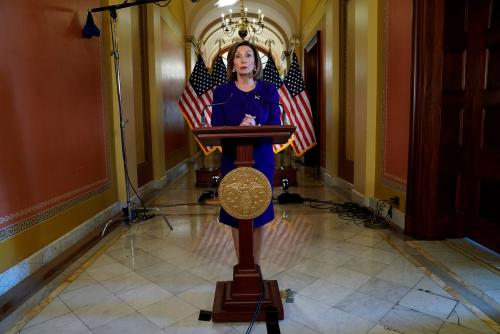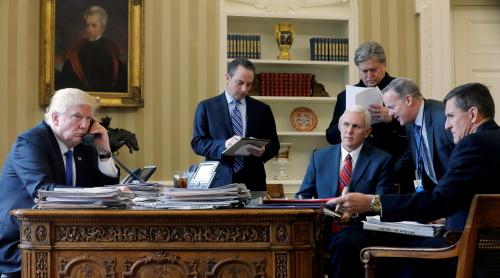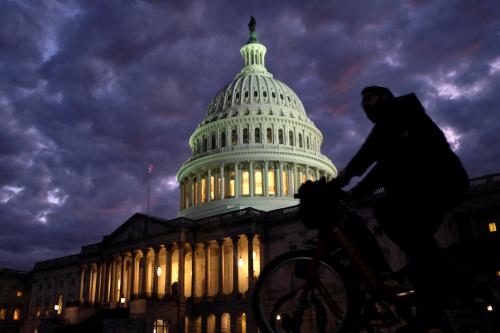The impeachment inquiry into President Trump reached what we may look back on as a turning point this week. Congress returned to work, a parade of witnesses defied the White House to testify, the ongoing crisis in Syria produced a 354 to 60 vote against the president’s action that included 129 Republicans, Trump’s best friend Sen. Lindsay Graham (R-S.C.) criticized him openly, and Majority Leader Mitch McConnell confirmed that he would indeed hold a trial in the Senate—possibly before Christmas.
Why are things moving so quickly? And what needs to happen next? The answer to the first can be found in the Nixon impeachment and the answer to the second in, of all unlikely places, the theatre.
Everyone old enough to remember the Watergate investigation recalls how, month after month, the question on everyone’s mind was “What did the president know and when did he know it?” Without the existence of a tape recording that definitively answered that question Nixon may have limped, wounded, to the end of his second term.
This time is different. There is no question that the president himself is directly involved in all four of the likely articles of impeachment. He did fire Comey and tell people it was to stop the Russia investigation—which will be central to an article built around obstruction of justice. He did order military aid to Ukraine held up and ask the Ukranian president to investigate a political rival. This is not only a violation of federal election law; it probably counts as a constitutional abuse of power. His many directives to defy Congressional requests for documents and witnesses is clearly an obstruction of Congress. And finally, the existence of a continued financial stake in his businesses such as the Trump hotel blocks from the White House, and his shameful insistence that the next G7 meeting be held at his resort in Florida, constitute a clear violation of the emoluments clause of the Constitution.
In other words, unlike so many troubled politicians before him, Trump cannot defend himself on the grounds that there were rogue operators in his circle. In this case, the president is the rogue operator.
Nonetheless, public opinion has yet to catch up to the storm of action in Congress. For instance, the Gallup poll and the Quinnipiac poll show movement in favor of impeaching and removing Trump from office, +7 and +9 points respectively—both of which are outside the margin of error (+/-3-3.5 pts).
| “Next we have some questions about the allegations being reported in the news concerning President Trump. Based on what you know at this point, do you think that Donald Trump should or should not be impeached and removed from office?” (Gallup) | |||
| June 3-16, 2019 | October 1-13, 2019 | Change (pct. pts.) | |
| Yes, should be | 45% | 52% | +7 |
| No, should not be | 53% | 46% | -7 |
| No opinion | 2% | 2% | 0 |
| Note: the July questionnaire asked about the Mueller report specifically. | |||
| “Do you think that President Trump should be impeached and removed from office, or don’t you think so?” (Quinnipiac) | |||
| Yes/Impeach | No | DK/NA | |
| Oct 14, 2019 | 46% | 48% | 7% |
| Oct 08, 2019 | 45% | 49% | 6% |
| Sep 30, 2019 | 47% | 47% | 6% |
| Sep 25, 2019 | 37% | 57% | 6% |
| Sep 25, 2019 | 37% | 57% | 6% |
However, as my colleague Bill Galston has shown, much of this movement has come from Democrats and many voters still prefer voting Trump out of office instead of impeaching and convicting him. On the other hand, Trump is in dangerous territory. Below is a table using Gallup data which has asked the same question during the three modern impeachments:
| “Based on what you know at this point, do you think that [name of president] should or should not be impeached and removed from office?” (Gallup) | ||
| High Point of public support for impeachment and removal – Nixon | High point of public support for impeachment and removal – Clinton | High point of public support for impeachment and removal – Trump (to date) |
| 58%, August 1974 | 35%, Sept 1998 | 52%, Oct 2019 |
So what will change that dynamic? A strong and dramatic presentation of the case. Walter Shapiro, a seasoned political reporter, wrote the following last week,
“Awash in advice from constitutional scholars, House Democrats desperately need to hear from top theatrical directors. Because the only way that Trump’s impeachment will be more than a Democrats-only quest is if the dramatic arc becomes as compelling as Watergate. And that means that the target audience now should be wavering Republican voters appalled by Trump’s conduct and Republican legislators who are privately ashamed of their timidity.”
Having made the decision not to call for an impeachment inquiry vote—an unnecessary trip down a political rabbit hole with no useful legal impact—Democrats now have to decide how to tell this story if they want to have any chance of chipping enough Republicans away from Trump to convict him. Their track record on storytelling is simply not very good. Starting with the Ollie North hearings way back in the 1980s and up through the Kavanaugh hearings last year, Democrats have shown a singular talent for having a case but blowing the presentation.
Nonetheless, there are some hopeful signs. The biggest crack in the Republican front has come over Trump’s precipitous withdrawal of American troops from Syria. This surprise step has had catastrophic consequences. After a disastrous White House meeting that led to a walkout of Congressional Democrats, a picture of Pelosi lecturing the president went viral. She is standing across the table from him in the Cabinet room making a point. At a press conference the next day she explained that she was saying to him:
“The Russians were the beneficiaries of any withholding of assistance or encouragement to the Ukraine. Again, Putin benefits. The Russians benefited, Putin did, when the president placed some doubt about our commitment to NATO, right from the start of his administration. All roads lead to Putin. Then, the president said, ‘Well, the reason I’m taking the troops out of Syria is because I promised in the campaign to bring the troops home.’ My question to him is, is Saudi Arabia home? Is Saudi Arabia home? […] He said ‘Well, the Saudi Arabians are paying for it.’ Really, we’re putting our troops in harm’s way for Saudi Arabia because they’re paying for it? […] What it did do was cause a meltdown on the part of the president because he was unhappy with those questions.”
So perhaps we have the beginning of a compelling narrative into which all else fits?
All roads lead to Putin.
This work is licensed under the Creative Commons Attribution-NonCommerical-NoDerivatives 4.0 International License. To view a copy of the license, visit https://creativecommons.org/licenses/by-nc-nd/4.0/.
The Brookings Institution is committed to quality, independence, and impact.
We are supported by a diverse array of funders. In line with our values and policies, each Brookings publication represents the sole views of its author(s).








Commentary
All roads lead to Putin: This week in impeachment
October 18, 2019